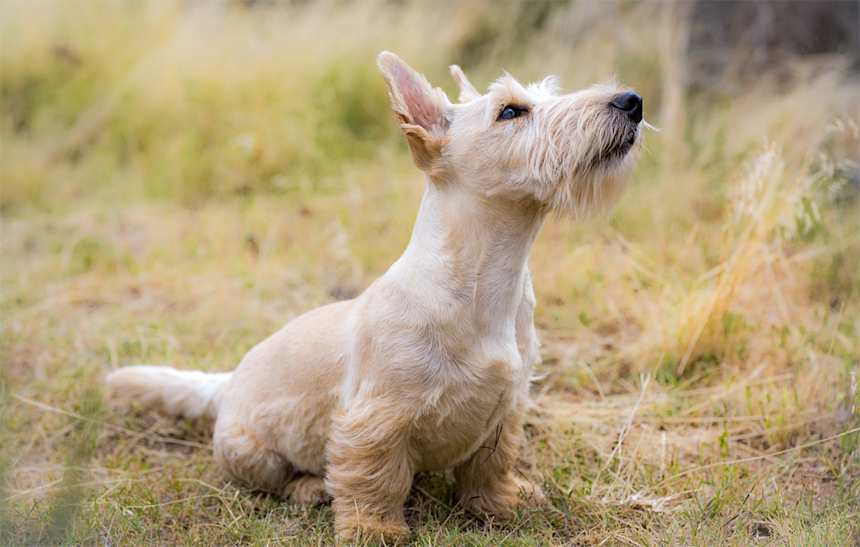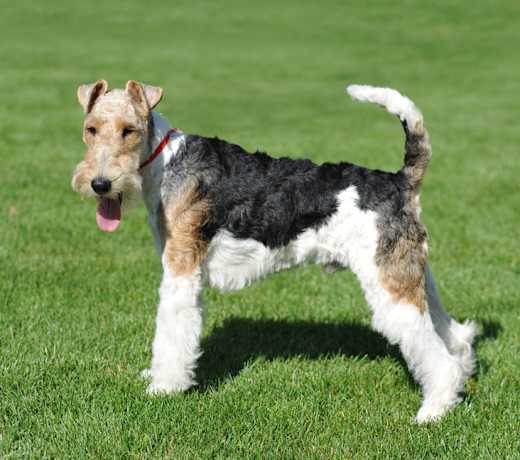Yes, there are white Scottie dogs, although they are quite rare and not typically seen in the breed standard. Black is the most common color for this breed but they can also come in colors such as wheaten or brindle. If you come across a white Scottie, it’s likely due to a mix with another breed or a genetic anomaly rather than being a standard color for the breed.
Scottish Terrier
Breed Type: Terrier
Common nicknames: Scottie, Aberdeen Terrier
Coat: Wiry, double
Hypoallergenic: No, they will likely trigger allergies.
Temperament: Intelligent, alert, protective, affectionate
Life expectancy: 10-12 years
Color & patterns:

The charismatic Scottish Terrier, affectionately known as the “Scottie” or “Aberdeen Terrier,” exudes charm, intelligence, and unwavering loyalty to their humans. With their sturdy build and iconic, wiry coat, Scottish Terriers are instantly recognizable. Standing at around 10 inches tall, they possess a distinct silhouette and an endearing bearded face that melts hearts. Scottish Terriers are independent thinkers and possess a great ability to tackle challenges with determination. Whether learning new tricks, engaging in stimulating activities, or simply making you laugh with their entertaining antics, Scottish Terriers are always up for a mental challenge. Their intelligence and loyal, affectionate nature make them fantastic pets for anyone.
Scottish Terrier characteristics
Learn about about Scottish Terrier basics like their fur colors, shedding levels, how much grooming they need, and other Scottish Terrier facts.
Average height
10-11 inches (25.4-27.9cm)
Average weight
16-30 pounds (7.3-13.6 kg)
Average lifespan
10-12 years
Exercise needs
Grooming needs
Full-grown size
Good with cats
Good with kids
Training aptitude
How big do Scottie dogs get?
Adult Scotties typically stand about 10 inches tall at the shoulder and weigh between 18 and 22 pounds, with males being larger than females.
Do Scottie dogs shed?
Yes, Scotties shed, but they’re not heavy shedders. Regular grooming, such as brushing their coat a few times a week, can help manage shedding and keep their coat looking tidy.
What does a Scottie look like?
Scotties are small to medium-sized dogs with a distinctive appearance. They have a compact and muscular build, with a wiry outer coat and a soft undercoat. Their ears are pointed and stand erect, giving them an alert and perky expression. Their tail is usually short and carried upright.
How long do Scottie dogs live?
On average, Scotties have a lifespan of about 12 years. Of course, their lifespan can vary based on factors such as genetics, diet, and overall health care.
When is a Scottie fully grown?
A Scottie is typically considered fully grown when they reach around 10 to 12 months of age. By this time, they've usually reached their full height and weight. However, like all dogs, they’ll continue to mature mentally and might still display puppy-like behavior for a while longer.
Scottish Terrier history
Learn about where the Scottish Terrier came from.
What were Scotties bred for?
Scottish Terriers, often called Scotties, were originally bred for hunting vermin like rats and badgers. They have a strong prey drive and are quite fearless, which makes them effective hunters.
Scottish Terrier temperament
Learn about about the Scottish Terrier temperament and how well they fit into your lifestyle, home environment, and family.
Are Scotties good with kids?
Yes, Scotties can get along well with kids who understand how to interact with dogs respectfully. Due to their small size and feisty nature, Scotties might not be the best match for very young children who might accidentally play too rough with them.
As always, it’s essential for pet parents and parents of children to supervise interactions between dogs and kids to ensure everyone’s safety and for parents to teach kids how to approach and handle dogs properly.
Do Scottie dogs bark a lot?
Yes, Scotties are known for being vocal dogs, so they can bark quite a bit. They’re alert and protective, so they might bark to alert their pet parent of anything unusual happening around them. Early training and socialization can help manage excessive barking.
Are Scottie dogs good pets?
Yes, Scotties can make excellent pets for the right person. They’re loyal, affectionate, and have a lot of personality packed into their small bodies. They enjoy being part of the family and thrive on companionship. However, they can also be independent and a bit stubborn, so they require consistent training and leadership from their pet parent.
Are Scotties good with cats?
Yes, Scotties can get along with cats, especially if they’re introduced to them at a young age and properly socialized. However, their prey drive might lead them to chase smaller animals, so it’s essential to monitor their interactions with cats and other small pets.
Are Scotties good with other dogs?
Scotties can be selective when it comes to other dogs. They often have strong personalities and might not always get along with other dogs, especially if they perceive them as a threat or challenge. Early socialization and training can help them learn to coexist peacefully with other dogs, but it’s always a good idea to supervise their interactions.
Are Scotties smart?
Yes, Scotties are generally considered smart dogs. They have a quick wit and can pick up on things quite easily. However, their intelligence can sometimes come with a side of stubbornness, making training a bit of a challenge.
Are Scotties good guard dogs?
Yes, Scotties can make good guard dogs. They’re alert and vigilant, always on the lookout for potential threats. Their bark can deter intruders, making them aware that someone is watching the property.
Are Scotties good apartment dogs?
Yes, Scotties can adapt well to apartment living, provided they get enough exercise and mental stimulation. While they have energy to burn, they don’t require a large yard to run around in. Regular walks and playtime indoors can help keep them happy and healthy in an apartment setting.
Are Scotties affectionate?
Yes, Scotties can be quite loving and affectionate with their pet parents. They form strong bonds with their families and enjoy spending time with them. However, they can also be independent and may not always be in the mood for cuddles. It’s all about finding a balance that suits both the Scottie and their pet parent’s preferences for affection.
Are Scotties easy to train?
No, Scotties are not easy to train. Their training can be a bit challenging due to their independent nature and stubborn streak. They’re intelligent dogs but can be somewhat aloof and may choose to ignore commands if they’re not interested.
However, training any dog takes substantial time and effort, regardless of breed. Consistency, positive reinforcement, and patience are key when training your dog, as is starting training early and keeping sessions short and engaging.
Scottish Terrier health
Learn about about the Scottish Terrier health outlook and what diseases they may be prone to at various stages of their life.
Are Scotties healthy dogs?
Yes, Scotties are generally healthy dogs, but like all breeds, they can be prone to certain health issues. Some of the common health concerns for Scotties include:
Craniomandibular osteopathy (CMO): Also known as “Lion Jaw” or “Scotty Jaw,” this excessive bone growth in the jaw can cause discomfort to your Scottie when they chew. Though it is quite painful and can cause feeding issues, most puppies grow out of it once they reach adulthood.
Von Willebrand’s disease: Von Willebrand's disease (vWD) is the most common inherited bleeding disorder in dogs. It happens when a dog does not produce enough of a specific protein that helps the blood cells used in clotting stick together. This results in dogs being unable to clot properly, which could cause hemorrhages or other bleeding issues. The deficient protein is called von Willebrand factor (vWF).
Legg-Calve-Perthes: This condition causes the head of the femur (located in a dog’s hind leg) to spontaneously degenerate. Over time, this will lead to erosion of the hip joint and arthritis. A Scottie suffering from Legg-Calve-Perthes will become lame, limp while walking, and experience pain when moving the hip joint. Surgery is the most effective treatment for the disorder.
“Scottie cramp”: This specifically affects Scottish Terriers, likely due to the small original genetic pool. It causes muscle spasms in young Scotties, sometimes several times a day.
Atopic dermatitis: This skin reaction is caused by allergens in the environment
Patellar luxation: Also known as slipped kneecaps, patellar luxation is a common problem in many dog breeds. It occurs when slight abnormalities cause the knee joint to slide in and out of place. This can cause pain and occasional lameness. Surgical treatment is available for severe cases, although many dogs lead normal lives without treatment.
Regular veterinary check-ups and staying informed about the breed’s health issues can help in early detection and treatment if needed.
Are Scottie dogs hypoallergenic?
No, Scotties are not considered hypoallergenic dogs. They have a double coat that sheds, which can contribute to dander and allergens in the home. If someone in the household has allergies, it’s essential to consider this factor before bringing a Scottie into the home. Regular grooming and cleaning can help reduce allergens, but they won’t eliminate them entirely.
Popular Scottish Terrier mixes
Common Scottish Terrier breed mixes include:
Bascottie (Scottish Terrier + Basset Hound)
Scoodle (Scottish Terrier + Poodle)
Scotchi (Scottish Terrier + Chihuahua)
Scolden Terrier (Scottish Terrier + Golden Retriever)
Pugottie (Scottish Terrier + Pug)

Find Scottish Terrier puppies near you
Adopting a Scottish Terrier
Learn about acquiring a Scottish Terrier - the pros and cons of adopting versus going through a breeder, and associated costs.

Penny
Scottie, Scottish Terrier Cairn Terrier
Female, 3 yrs 7 mos
WestLake Village, CA
Good with dogs
House-trained
Spayed or Neutered
Shots are up-to-date

Penny
Scottie, Scottish Terrier Cairn Terrier
Female, 3 yrs 7 mos
WestLake Village, CA
Good with dogs
House-trained
Spayed or Neutered
Shots are up-to-date



